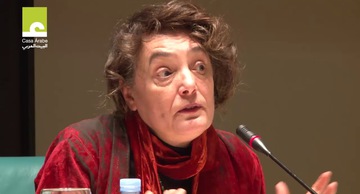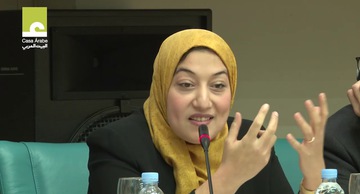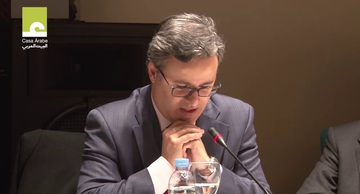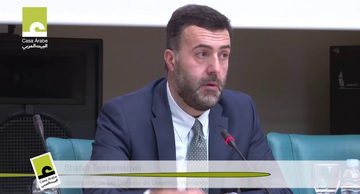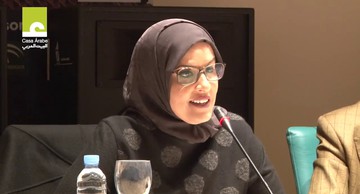

Gender Politics in Tunisia and Libya (Arabic)
نشرت 09 مارس 2021
ALL VIDEOS IN THIS CATEGORY
-
Through Forts and Frontiers: A conversation with Safaa Fathy (ARABIC)
01.24.2018. During this event at Casa Árabe, Arabist Francisco Manuel Rodríguez Sierra held a conversation with Safaa Fathy about her art work, marked by her reality as an expatriate living in Europe, and how it can be framed with the current Arab cultural scene. Appearing with Fathy, a writer, artist and philosopher, and Rodríguez Sierra, a professor of Arab and Islamic Studies at the Universidad Autónoma de Madrid, was Pedro Martínez-Avial, the General Director of Casa Árabe, who introduced and moderated the event. We took advantage of the presence of this well-known intellectual to speak about the transformations which have taken place in the Arab world in recent years. Safaa Fathy (Menia, 1958) is one of the best-known Egyptian writers and creators in the cultural scene on the Nile. With a bachelor’s degree in English Literature, she has resided in Paris since 1981, where she earned a PhD at the Sorbonne (1993) with a study on Bertolt Brecht. Since then, Safaa Fathy has developed a multifaceted artistic production, in Arabic, French and English, which ranges from writing poetry and plays to directing theater and cinema works, as well as being a literary critic and producing philosophical writings. A notable feature of her work is her close relationship with French philosopher Jacques Derrida, with whom she wrote a book (Tourner les mots: au bord d’un film, 2000) and to whom she dedicated some of her documentaries. She has been the director of programs at the International College of Philosophy in Paris. Francisco Rodríguez Sierra has a PhD in Arabic Philology from the University of Cadiz (2003) He has been a professor at the University of Granada’s Translation School (2006-2007) and a coordinator and Arabic language radio announcer for Spain’s Foreign Radio Service, Radio Exterior de España (2007-2011). Since 2011, he has been a professor with the Department of Arab and Islamic Studies at the Universidad Autónoma de Madrid. His focal points of research include mainly modern Arab novels and translation studies. He has had articles published about the translations of Don Quixote into Arabic and the view of this work by Cervantes in the Arab world. He is also a literary translator. More info: http://en.casaarabe.es/event/through-forts-and-frontiers-a-conversation-with-safaa-fathyنشرت 01 فبراير 2018 -
Democracy in Tunisia: The transition’s achievements and challenges (ARABIC)
12.13.2017. On the verge of the seventh anniversary of Tunisia’s revolution, Casa Árabe organized this conference with the participation of four important personages from that country. The event was presented by Pedro Martínez-Avial, the General Director of Casa Árabe, and moderated by Juan López-Dóriga, the Ambassador of Spain in Tunisia. It included interventions by Saida Ounissi, the State Secretary of Professional Training and Entrepreneurship; Ziad Krichan, director of the daily newspaper Al Maghreb; Chaima Buhlel, director of programs at the Barr Alaman Association, and Gazi Ben Ahmed, an economist and the founder of the “Mediterranean Development Initiative.” The Tunisian political transition is admired all over the world because it has been democratic, consensual and integrating. The Constitution of 2014 guarantees freedom of thought and political pluralism, women’s rights and an independent justice system. The young Tunisian democracy sends a strong message in the Arab and Islamic world. It plays a central role in the Mediterranean and is looking Europe head-on. A provisional overview of the major advancements in freedoms in Tunisia brings up questions which transcend far beyond its borders: What makes the Tunisian experience so unique? What role can be played by political parties and civil society? Why is it so important to continue moving forward on key aspects like equality for women and municipal democracy? At the same time, seven years after the Tunisian revolution took place, significant challenges continue to exist: democracy should come with responses to the expectations for greater social justice that arose during the revolution in 2011. An in-depth reform of the economy which produces jobs, especially among youths, remains at the forefront of debate over the definitive consolidation of Tunisia’s democratic experience. What are the government’s plans? How is wealth going to be created and distributed? And how will social services be improved so that they reach everyone? How can the European Union contribute to clearing the way for these improvements? To find answers to these and other questions, Casa Árabe organized this conference, with the participation of four well-known personages from the country. More info: http://en.casaarabe.es/event/democracy-in-tunisia-the-transition’s-achievements-and-challengesنشرت 11 يناير 2018 -
Youth and Prospects for Human Development in the Arab World
2017.12.12. Casa Árabe and the Real Instituto Elcano, with the cooperation of the Regional Office for Arab States of the United Nations Development Program (UNDP) presented the results of the latest report on Arab Human Development, titled “Arab Youth and the Prospects for Human Development in a Changing Reality” in Madrid at a round table discussion on the challenges and opportunities of Arab youths within a context of change, political transformations and conflicts experienced throughout the region in recent years. Arab youths are the largest generation of youths to have existed in the Arab world over the last 50 years. 30% of the 370 million people living in Arab countries are between the ages of 15 and 29, and over 50% of the population is under 30 years old. Moreover, they are the best-prepared, most active generations of youths with the greatest connections to the rest of the world. The report also claims that they may also create major momentum for the development of these countries, while strengthening their stability and ensuring advancements in a sustainable way, if the necessary policies are implemented to give these youths a central role in defining their societies, at the political, social and economic levels. SCHEDULE 7:00 p.m. Opening Pedro Martínez-Avial, the General Director of Casa Árabe Haizam Amirah Fernández, Head Researcher on the Mediterranean and Arab World, Real Instituto Elcano 7:30 p.m. Presentations given by: Nisreen Salti, an associate professor at the Economics Department of the American University of Beirut Moderated by: Olivia Orozco, Casa Árabe’s Training and Economics Coordinator. More info: http://en.casaarabe.es/event/youth-and-prospects-for-human-development-in-the-arab-worldنشرت 13 ديسمبر 2017 -
Human Rights Council: Taking stock and identifying challenges for 2018-2020
2017.11.12. Casa Árabe and the Human Rights Office of Spain’s Ministry of Foreign Affairs and Cooperation organized this conference as part of the 69th Anniversary of the Universal Declaration of Human Rights. The event was presented by Pedro Martínez-Avial, the General Director of Casa Árabe and moderated by Adela Díaz, Director of the Office of Human Rights, with speeches by Juan Ignacio Morro, the United Nations Director General of Human Rights; Shalva Tsiskarashvili, Vice-President of the Human Rights Council; Walid Doudech, the Permanent Representative Ambassador of Tunisia to the United Nations Office in Geneva, and Esteban Beltrán, director of the Spanish section of Amnesty International. As occurs each year, on December 10 we celebrate the anniversary of the Universal Declaration of Human Rights. Spain’s Ministry of Foreign Affairs and Cooperation is focusing this year’s celebration on the Human Rights Council. Last October 16, Spain was chosen to become a member of this main body for defending and promoting Human Rights around the world, for the time period of 2018-2020. Becoming a member of the Human Rights Council can be seen as an acknowledgment of a State’s commitment in this arena and also provides an opportunity to contribute actively to the Council’s development and work. The round table discussion will attempt to take stock of events and foresee the main challenges to be faced by the Council looking ahead to the upcoming years, from different perspectives: from that of a current member State, that of a future member State and that of the structure of the Council itself and civil society. More info: http://en.casaarabe.es/event/human-rights-council-taking-stock-and-identifying-challenges-for-2018-2020نشرت 13 ديسمبر 2017 -
The State of Qatar’s Policies on International Cooperation and Social Work (ARABIC)
2017.23.11. The objective of this conference was to show the efforts made by Qatar’s government on international cooperation, the culture of peace and the rejection of violence. The event was presented by the General Director of Casa Árabe, Pedro Martínez-Avial, and included interventions by Tariq Al-Ansari, an ambassador and the Director of the Department of International Cooperation of the Ministry of Foreign Affairs, and Amal Al-Mannai, CEO of the Qatar Foundation for Social Work. This conference is an attempt to demonstrate the efforts made by the State of Qatar in the field of international cooperation as an important part of its foreign policy, to pass the culture of peace on amongst today’s generations and prepare responsible leaders for the future on dialogue and the rejection of violence. Therefore, the leaders of the State of Qatar have attempted to play an active role in strengthening their position in the political, development and social arenas. These efforts are framed within the strategy of international cooperation led by Qatar’s Ministry of Foreign Affairs as part of the National Vision for Qatar of 2030 which seeks to promote a global association for the creation of safe, peaceful societies headed by institutions which are able to protect stability and serve the different parties in society, with the goal of achieving the 17 United Nations Sustainable Development Goals based on the principles agreed to in the Millennium Declaration, along with the State of Qatar’s social responsibility in terms of humanitarian aid. The scope of action of Qatar’s Foundation for Social Work is social work at the local, regional and international levels. To do so, it has designed policies and strategies for social action, thereby allowing it to consolidate prior achievements, create effective alliances, strengthen the bonds of cooperation and build bridges for coordination with the proper governmental entities, as well as with the most important public and private institutions worldwide, because it wishes to become a role model in the field of social work. This foundation is of a consultative nature on the United Nations Economic and Social Council (ECOSOC). More info: http://en.casaarabe.es/event/the-state-of-qatar’s-policies-on-international-cooperation-and-social-workنشرت 12 ديسمبر 2017

